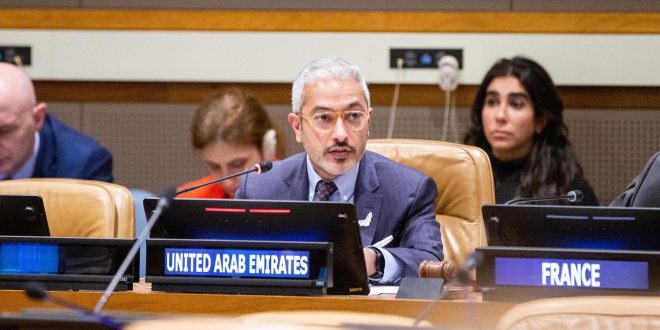The United Arab Emirates today chaired a United Nations Security Council Arria Formula meeting with France, Italy and Cyprus on the protection of cultural heritage during armed conflict.
The UAE convened the meeting in line with its longstanding belief in the importance of cultural heritage as both an embodiment of a country’s identity and history, and an effective gateway to spreading the values of tolerance, coexistence and common humanity between peoples and nations.
The UAE’s statement was delivered by Ambassador Mohamed Abushahab, Deputy Permanent Representative of the UAE to the UN.
Ambassador Abushahab stressed that “the destruction, distortion, or looting of cultural heritage in armed conflict situations has serious repercussions that threaten building and sustaining peace. This is why the Security Council adopted its historic Resolution 2347, which explicitly recognises that the unlawful destruction of cultural heritage and the attempt to deny historical roots and cultural diversity in this context can fuel and exacerbate conflicts and hinder national reconciliation.”
He added, “Resolution 2347 also affirmed that directing unlawful attacks against cultural heritage sites may constitute, in certain circumstances, a war crime, which requires the preservation of cultural heritage in order to maintain international peace and security.”
In recent years, the UAE has sponsored several programmes that preserve cultural heritage. In 2016, the UAE hosted an international conference on Safeguarding Endangered Cultural Heritage in partnership with France. The conference resulted in the Abu Dhabi Declaration, in which 40 countries and international organisations committed themselves to supporting the establishment of safe havens for cultural heritage under threat during conflicts.
The UAE launched the International Alliance for the Protection of Heritage in Conflict Areas (ALIPH) in 2017, which has so far supported initiatives to protect cultural heritage worth US$ 50 million in more than 30 countries.
The “Revive the Spirit of Mosul” project, where the UAE collaborated with UNESCO and the European Union, was launched to reconstruct the ancient historical city.
Participants in the Arria Formula meeting reviewed progress achieved in the implementation of Resolution 2347, including developments in the nature of armed and escalating conflicts around the world. These conflicts necessitate a continuous evaluation of the methods used to protect cultural heritage, the importance of its role in building peaceful societies, and preventing its exploitation by terrorist groups as a tool for financing or spreading intolerance and hatred. Participants also focused on restoring and reconstructing cultural heritage as part of efforts to build and sustain peace, and to involve local communities by raising their awareness about its importance and role in maintaining peace and security.
The UAE reiterated the international community’s responsibility to prevent the abuse of cultural heritage, particularly by terrorist and armed groups, and welcomed further opportunities to exchange ideas to prevent any abuse of this heritage.
During the Arria Formula meeting, the Council was briefed by Audrey Azoulay, Director-General of UNESCO; General Vincenzo Molinese, Commander of the Carabinieri for the Protection of Cultural Heritage; and Omar Al-Taweel, UNESCO Site Coordinator for the “Revive the Spirit of Mosul” initiative.
In her statement, Director-General Azoulay said that protecting cultural heritage should be an essential aspect of peacekeeping, highlighting UNESCO’s efforts to preserve cultural heritage in Ukraine, Yemen, and Iraq, and suggesting a mechanism for regular reporting to the Council. General Molinese highlighted the Carabinieri’s efforts to recover illegal, exported artifacts through cultural diplomacy and said that culture is of global public benefit.
In addition, Al-Taweel provided an in-depth presentation on the history of Mosul. He described Daesh’s attacks on the city between 2014 and 2017, which included the destruction of the Al-Nabi Yunus Mosque/shrine. He noted that the reconstruction of heritage, including the “Revive the Spirit of Mosul” initiative, is a key tool to empower residents as agents of change and as participants in rebuilding the city through culture and education, and also develops the skills of young people, providing international experience in the field.
 UAE BARQ برق الإمارات – نبضك
UAE BARQ برق الإمارات – نبضك


